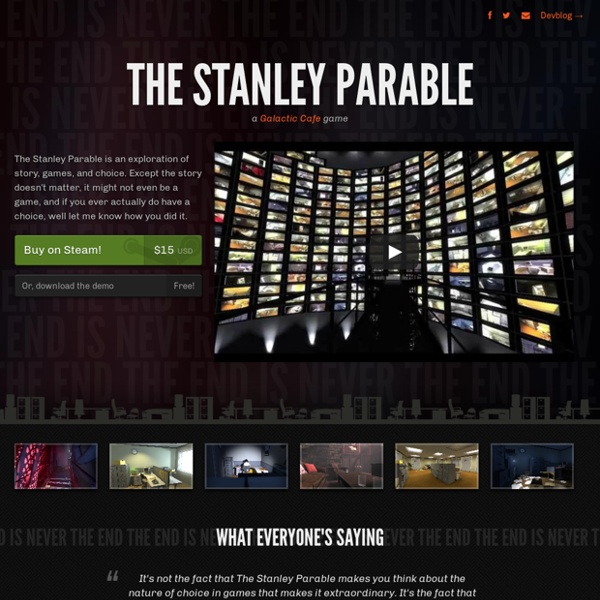



The Banner Saga Parallax by Zi Ye and Jesse Bursty - "interdimensional platforming and puzzle-solving game" #igf2012 Submitted to this years IGF 2012, Parallax by Zi Ye and Jesse Burstyn is an interdimensional platforming and puzzle-solving game. The goal in each level is to reach the exit by travelling between two overlapping dimensions through rifts. Parallax challenges the player to think beyond the spatial boundaries of traditional platformers. Parallax is still in beta. The team is aiming for a PC and Mac release and possibly iOS/console. If you would like to be notified when the game is released, subscribe to updates on Toasty Games‘s website. After a series of failed experiments, they finally found a way that’s both efficient and flexible. Ben Kuchera has posted a conversation with the developer duo on arstechnica which you can read here. Toasty Games
Risk of Rain Kentucky Route Zero The Floor is Jelly Brothers - EN Mark of the Ninja | The Official Blog NaissanceE | A LimasseFive Game About Door Kickers | KillHouse Games Door Kickers is an innovative real-time strategy game that puts you in charge of a SWAT team and lets you command them during a tactical intervention. Analyze the situation, plan team routes, choose equipment and breach points and coordinate multiple troopers to reach the hostage room before the bad guys get to press that trigger. It may sound daunting, and like real world CQB combat, it sure is. But most levels can be completed in minutes and on the fly improvisation works. Achieving the perfect planning, getting the mission done with no false steps, that’s a skill harder to master. (check out the press coverage to see what others have to say about the game) Buy here Previous Next Go to slide 1Go to slide 2Go to slide 3Go to slide 4Go to slide 5Go to slide 6Go to slide 7Go to slide 8Go to slide 9Go to slide 10Go to slide 11Go to slide 12Go to slide 13Go to slide 14Go to slide 15Go to slide 16Go to slide 17Go to slide 18Go to slide 19 Quick Points: Tell me about Scenarios! Your troopers Wait!
Rogue Legacy A game about life and feet by Colin Northway New: Incredipede for iOS and Anroid Incredipede is available now for iPhone and iPad from the Apple App Store, and for Android phones & tablets via Google Play. It's only $3.99 and pretty much the same as the full game below. Incredipede is especially visceral on a touchscreen; pulling limbs out of Quozzle with your finger feels wet and slimy. In a good way, though. Buy Incredipede for Windows and Mac Incredipede is available now from Steam, GOG, and direct from us right here, right now: Get Incredipede FREE for Linux! Download & learn more here